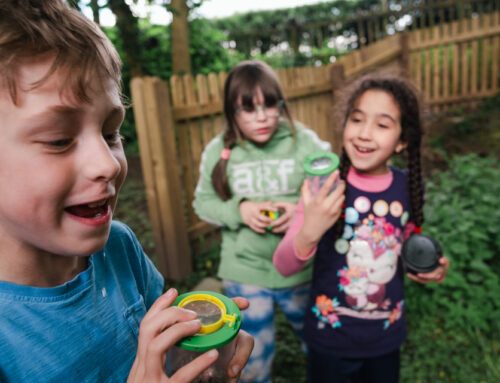When Flexi Schooling became Mainstream…Maybe…?
Slightly Mad Mummy – In Slightly More Serious Mode!
It goes entirely without saying that it has been, and still is, a strange old time. When it comes to situations we never thought we’d find ourselves in, we can take our pick at the moment: zooming into work meetings in our pyjama bottoms (the work attire du saison); the whole world standing two metres apart (and thus finally putting my ideal minimum personal space requirements into legislation…#winning), and, of course, having our children at home and thus dipping our toes, and sticking our noses, into their education.
Of course, this education at home is not true home education; that can be as richly sociable, varied and out-of-the-house as you wish, whereas at the moment, it cannot. And yet, despite these temporary curtailments, some of us brave or foolhardy folks have actually derived a certain amount of pleasure in this deeper involvement in our child’s education; as frustrating as our little (and not so little) ones can be, some of us have found that we kind of don’t mind this lark, and may be considering making it more long-term.
Certainly, home education in its non-lockdown form can be a fantastic option for a high learning potential child, mainly because it’s usual form can take so very many shapes that it can always be made bespoke to your own square-pegged needs. Others, however, might be sad to lose that special involvement of recent times, but unsure about full-time home education. And it is in this way that one of the strangest unexpected consequences of covid’s “new normal” arises: that our little, niche flexi-schooling arrangement may well become quite de riguer. Certainly, such a thing is only ever possible by accident. It is of no surprise to me at all that it has taken a global crisis to force fashionableness on this flexi-family. But fashionable it may well become. Flexi-schooling, if agreed upon by your child’s school, can be a wonderful way forward for high learning potential children and their families, and there are families across the country already enjoying this best-of-both-worlds situation. It’s not for everyone, and does depend on the agreement of the school, but if full-time home education is off the cards for work/health/sanity reasons (though if you are keen on full-time home ed., there is often a way to be found that can make it possible), then flexi can be a very good way of incorporating the kind of freedom you enjoy with home ed. without giving up on the benefits you may still enjoy from school.
If these weren’t reasons enough for flexi-schooling to be in vogue, then if schools will be required to satisfy social distancing requirements during the first phases of the easing the lockdown, then a part-time timetable may well rise from the depths of niche obscurity to establishment, in one, giant leap of a once-in-a-lifetime-crisis. Of course the disclaimer must be that a part-time timetable in this kind of situation may, strictly speaking, bring with it more of a traditional take-home-the-school-work-and-do-it-at-home kind of expectations, but certainly, the possibility of a more independent kind of flexi-schooling may at the very least be more easily put on the table as a possibility, certainly more easily than every before. If you do feel that now might be the time to consider such a set-up, take a look at our advice sheet PA303 Flexi Schooling for more information. There may well never be a better time to approach a school with such a proposal; this quite unexpected, but very possible, alignment with government thinking and necessity in this “new normal” gives the mere idea of flexi schooling a rare but welcome validity boost. If you want to, make the most of it!
So why do parents with high learning potential children tend to consider flexi schooling? Well, the beauty of being at home is that freedom to go at the pace you want, the level you want and about whatever you want, that can so beautifully meet many high learning potential children’s needs. A day or two (or three or four) of not having to conform, of not being bored, of not being hamstrung by the national curriculum and the age-related hold backs, can be transformative for the wellbeing of a square-pegged high learning potential child, let alone their education. A day or more when the topics can be the ones they love; when they can delve as deeply as they wish into that subject with no glass ceilings, no restrictions, no barriers; a day when they can go at the pace that they want and need; a day when they can satisfy their intellectual overexcitability (and appropriately support any other overexcitabilities), can be truly therapeutic for a high learning potential child who has been experiencing some difficulties or frustrations in the traditional school setting. Indeed, often, even just one day a week, flexi-schooling can be so nourishing for a high learning potential child that it is almost like hitting a reset button after the stresses and strains of trying to fit into a school day that doesn’t fit them well at all. At the risk of running headlong into hyperbole, flexi schooling might even be re-named an HLP spa day: a chance for them to relax into their beloved interests and pamper their voracious curiosity.
Certainly, the positive effect on flexi-cat’s wellbeing has been the biggest reason that we continue with the flexi situation: it really is restorative for her. It provides a high learning potential child with the opportunity to explore their interests at their level and at their pace, but also affords a very useful breathing space if they are finding it difficult (and frustrating) to fit in and conform. In providing that space for them to express their true, intensely overexcitable, selves, they benefit from the very reassuring feedback that we not only acknowledge their particular needs, but we respect them, and are taking steps to try to support them accordingly.
Another benefit of flexi schooling can be the way in which it allows collaboration between parent and school. Whilst we may all wish that our high learning potential child’s education at school was perfect; more bespoke, we understand why it cannot always be this way. Of course, advocating for appropriate challenge at school is perfectly reasonable, however awkward or in vain it can sometimes be, but in suggesting a flexi-schooling timetable, you are showing that you are very definitely willing to do your bit to provide that tailored provision for which there is no longer any funding within state schools. It is an acknowledgement of the difficulty of getting square-pegged needs met in a large and busy classroom with limited time and resources, and one that may stand you in good stead if you need to advocate for your child in the future: you have, after all, shown an appreciation of the difficult job the school has in perfectly meeting every child’s needs on limited budgets and with finite resources. Showing such willingness to get involved ourselves and help to solve the problem may very well pay dividends, diplomacy-wise, in the future. And it can, quite simply, be a great solution: we can become our child’s very own little gifted pull out programme, if you will. Or we can even turn away from academics altogether: perhaps there’s a forest school day that they would benefit from? The possibilities are endless…
It may seem that I am essentially making an argument for full time home ed.: if it’s all so great, why not do it all the time? Well, for many, that may well be the best option, and it is one that we are all within our rights to choose. But there are sometimes benefits from a school setting on which one may not wish to entirely give up. There may be valued and valuable close friendships, excellent teachers, interesting extra-curricular activities, to name but a few. For some, rather than going full on home ed. and then having to find replacements for some of those positives that school already offered, flexi can be a good way of retaining the good stuff and avoiding throwing the baby out with the bath water.
The main caveat to my flexi schooling evangelism is that it is all entirely dependent upon agreement by your school’s headteacher. We cannot demand this as our right, even if it is right. But, hopefully, this “new normal” might just allow enough space for consideration of different ways of doing things, including how we piece together the best educational situation for our wonderfully unique high learning potential children. If you are keen to look into the ways of the flexi, then good luck, and welcome!
As Coldplay didn’t sing on “Fix You”:
“When schools try their best but they don’t succeed
To give our kids all they want and all that they need
When you know you’re square-pegged, square-pegged indeed..
Stuck on turbo-o-o-o
…
Flights of fa-a-a-n-cy
Time to be pra-a-a-n-cy
I will try…to flexi”
You can see more from Slightly Mad Mummy, who charts the fabulous (and fatiguing!) flexi-Fridays with her 8 year old (currently identifying as a cat and a Georgian), in flexi-cat lessons and diaries on our website.






